MODERN SLAVERY STATEMENT 2022





We acknowledge and pay respect to the original and ongoing custodians of the land upon which we live, work, learn and teach
We commit to actively working alongside First Nations people for healing, reconciliation and justice. The Catholic education faith community is inclusive and acknowledges that we are all made in the image and likeness of God and we are created in love. People of all faiths, genders, sexualities, abilities and cultures are therefore respected equally in the Sandhurst Catholic community.
We acknowledge the pain and suffering of all who have been hurt in body, mind and spirit by those who have betrayed the trust placed in them.
May we all stand tall, stand firm, grounded in truth, together as one.
Catholic Education Sandhurst Limited (CES Ltd) and Sandhurst
Catholic Early Childhood Education and Care (SCECE&C Ltd) is committed to the safety, participation and empowerment of all children.
This statement has been made on behalf of Catholic Education Sandhurst Limited (CES Ltd) ABN 94 493 967 364 and Sandhurst Catholic Early Childhood Education and Care (SCECE&C) ABN 98 643 978 205. This statement is prepared pursuant to section 134 of the Modern Slavery Act 2018 (Cth) and covers CES Ltd as a single reporting entity.
Catholic Education Sandhurst Limited (CES Ltd)

ABN 94 493 967 364.
120 Hargreaves Street Bendigo Vic 3550
PO Box 477, Bendigo Vic 3550
P: 03 5443 2377
E: enquiries@ceosand.catholic.edu.au
W: www.ceosand.catholic.edu.au

Sandhurst Catholic Early Childhood Education and Care Limited (SCECE&C Ltd)

ABN 98 643 978 205
120 Hargreaves Street Bendigo Vic 3550
PO Box 477, Bendigo Vic 3550
P: 03 5443 2377
E: scececenquiry@ceosand.catholic.edu.au
W: www.scecec.org.au
Principal Governing Body Approval
This modern slavery statement was approved by the governing body of Catholic Education Sandhurst Limited as defined by the Modern Slavery Act 2018 (Cth)1(“the Act”) on Tuesday 6 June 2023.
Most Reverend Shane Mackinlay Bishop of Sandhurst
Signature of Responsible Member


This Modern Slavery Statement was signed by a responsible member of Catholic Education Sandhurst Limited as defined by the Act on Tuesday 6 June 2023.
Patricia Cowling Chair-
Catholic Education Sandhurst Limited Board (CES Ltd Board)
Mandatory criteria
Please indicate the page number/s of your statement that addresses each of the mandatory criteria in section 16 of the Act:
Mandatory criteria
Page number/s
a) Identify the reporting entity. Page 8
b) Describe the reporting entity’s structure, operations and supply chains. Page 13
c) Describe the risks of modern slavery practices in the operations and supply chains of the reporting entity and any entities it owns or controls. Page 17
d) Describe the actions taken by the reporting entity and any entities it owns or controls to assess and address these risks, including due diligence and remediation processes. Page 24
e) Describe how the reporting entity assesses the effectiveness of these actions. Page 28
f) Describe the process of consultation on the development of the statement with any entities the reporting entity owns or controls (a joint statement must also describe consultation with the entity covered by the statement).* Page 28
g) Any other information that the reporting entity, or the entity giving the statement, considers relevant.** Page 30
* If your entity does not own or control any other entities and you are not submitting a joint statement, please include the statement ‘Do not own or control any other entities’ instead of a page number.
** You are not required to include information for this criterion if you consider your responses to the other six criteria are sufficient.
1. Section 4 of the Act defines a principal governing body as: (a) the body, or group of members of the entity, with primary responsibility for the governance of the entity; or (b) if the entity is of a kind prescribed by rules made for the purposes of this paragraph—a prescribed body within the entity, or a prescribed member or members of the entity.
2. Section 4 of the Act defines a responsible member as: (a) an individual member of the entity’s principal governing body who is authorised to sign modern slavery statements for the purposes of this Act; or (b) if the entity is a trust administered by a sole trust ee—that trustee; or (c) if the entity is a corporation sole—the individual constituting the corporation; or (d) if the entity is under administration within the meaning of the Corporations Act 2001—the administrator; or (e) if the entity is of a kind prescribed by rules made for the purposes of this paragraph—a prescribed member of the entity.
The vision for education in Sandhurst is to provide, in partnership with our families, stimulating, enriching, liberating and nurturing learning environments in each of the Catholic school communities within Catholic Education Sandhurst Limited (CES Ltd) and the two kindergartens conducted by Sandhurst Catholic Early Childhood Education and Care Limited (SCECE&C Ltd). At the heart of this vision is our commitment to the ongoing duty of care that we have for the safety, wellbeing, and inclusion of all children and young people.
that the values of the Gospel are central to who we are, what we do, and how we act.
The ongoing mission of Catholic education remains the mission of the Church“to spread the Kingdom of Christ over all the earth”. Under the precepts of Canon Law (806 1), the Bishop watches over Catholic schools in the Diocese and provides general regulations for them. The Sandhurst Catholic school today responds to its mission by ensuring education is provided according to Catholic Teachings and beliefs and by offering a particular cultural experience that is grounded in “... a Christian view of the world, of life, of culture and of history”. This translates into a Christ-centred ethos and worldview that permeates all aspects of school life including relationships, structures, liturgies, celebrations and routines, as well as the formal curriculum.





that we have a vital role in the mission of the Catholic Church to imagine and seek new horizons while respecting our Tradition.
that a strong sense of community is dependent on the quality of our collegial relationships.
that each person’s potential is fostered through the dedicated ministry of Catholic education. in leadership encompassing vision, innovation and empowerment.
The identity of the Sandhurst Catholic Schools and Kindergartens reflects the principles of Catholic social teaching, grounded in the person of Jesus and interpreted and enacted for the “common good” in response to the “signs of the times”. These principles require that the dignity and potential of each person be fully respected within a climate that is conducive to peace, security and development. This must find expression in the relationships, structures, curricula, planning, processes and care in the everyday life of the school and kindergartens.
Catechism of the Catholic Church, n.863 Congregation for Catholic Education. (1997), The Catholic School on the Threshold of the Third Millenium, n.14Catholic Education Sandhurst Limited (CES Ltd) transitioned to a new Governance structure in 2021. In 2022 each of the team requirements were and is currently establishing procedures and oversight of all our Catholic schools. Under the new company structure the roles of both Risk & Compliance and Procurement & Contracts have been designated to new roles within the organisation, to centrally focus on our procurement function and risk management in Modern Slavery.
To begin the CES Ltd Modern Slavery eradication journey, several initiatives began in 2021 to build a framework for the future of CES Ltd. These initiatives were further developed and embedded in 2022 with the below milestones achieved;
• Continues partnership with Australian Catholic Anti-slavery Network (ACAN) modern slavery risk management program.
• Social Justice Reference group working with ACRATH and CARITAS to educate our students and school communities.
• Modern Slavery Policy was developed and Board approved at the end of 2021. The policy was implemented to CES Ltd Schools on the Feast Day of St Joesphine Bakhita, 8th of February at St Anne’s College Kialla (Vic) and virtually.

• Procurement Procedures developed and implemented to include Modern Slavery Surveys in due diligence investigations.
• Procurement partnered with Vendor Panel to strengthen tendering and due diligence processes for procurement activities.
To strengthen our mitigation practices going forward the following initiatives are in development for 2022:
• A modern slavery communications program, consisting of education, advice and guidance to be delivered to the 52 CES Ltd Schools, 2 SCECE&C Early Childhood Centres and Head Offices in 2023. Modern Slavery awareness training to be rolled out through new training program currently being implemented (CompliLearn).
• A due diligence program for key suppliers is in development for 2024.
• A contact system for escalation protocol and remedy pathways policy and framework review.
• Utilising the SEDEX (ACAN program) platform to identify and assess the risk of engaging various suppliers who may have a red flag for modern slavery practices in their operations.
• Continue our partnership with ACAN with guidance and support through their webinars and compliance program.
CES Ltd aspirational goal is to identify and eliminate all risks associated with modern slavery from our operations, business partnerships and supply chain.

The Christian tradition affirms the inalienable dignity of each person: created in the image of God, with unique gifts and talents, connected with the whole of creation, enriched by relationships of friendship and love lived out in a shared common life, capable of astonishing creativity, insight and achievement, and invited into communion with the Triune God revealed by Jesus. This core Christian vision of the human person is fundamental to the mission of Catholic Education Sandhurst Ltd.
While the most immediate consequence of this principle is in the way that students are placed at the centre of Catholic education, it also directs the relationship that Catholic schools have to parents, staff and the broader community. Pope Francis has encouraged us to appreciate this community in widest possible sense, and we are becoming increasingly aware that our activities often have impacts stretching far beyond our local community.
There are many ways in which the various forms of modern slavery can affect the operations, business partnerships and supply chain of our schools, often in ways that are not immediately apparent. Practices such as human trafficking, child labour, and exploitation of workers for minimal or no wages are terrible abuses of human dignity and are contrary to the fundamental respect that Christians seek to promote for each person. Catholic Education Sandhurst Ltd is committed to doing all in its power to assist in eliminating these practices.
This is the second Modern Slavery Statement of Catholic Education Sandhurst Ltd since its new corporate structure was established in January 2021. I am very pleased to see that over the last year, the Company has taken significant steps to embed awareness of modern slavery in its operations, and to further identify and address ways in which it might be at risk of supporting modern slavery. The Company’s plans for 2023 focus especially on communication and training across its schools, kindergartens and offices. This will assist in promoting wider awareness in staff and students, and identifying both potential risks and potential opportunities for addressing them. I am confident that these strategies will help all involved in Catholic education in the Sandhurst Diocese to become more alert to the risks of modern slavery, and to act in ways that promote the dignity, freedom and wellbeing of each person.

Dear Community Members,
As the Chair of the Catholic Education Sandhurst Limited Board, I am pleased to share our commitment to eradicating modern slavery and human trafficking from our company and supply chains.

We are acutely aware that modern slavery and human trafficking remain pervasive issues in our world, and we strongly believe that every person deserves to live a life free from exploitation and oppression.
We are continuously improving our efforts to identify, prevent, and mitigate the risks of modern slavery in our operations and supply chain. We remain committed to working collaboratively with our suppliers, industry peers, and schools to address this critical issue and drive positive change.
To this end, we are working towards implementing a comprehensive set of policies and procedures that align with the highest Australian standards. These policies and procedures will include training for our employees, and regular risk assessments to ensure compliance.
We are proud to be part of a broader movement of organisations working together to eradicate modern slavery and human trafficking. By sharing best practices, resources, and knowledge, we can create a more sustainable and ethical supply chain and promote a world where human rights are respected and upheld.
Thank you for your continued support and partnership as we work together towards this critical goal.
Mrs Patricia Cowling Catholic Education Sandhurst Ltd Board Chair

As we prepare to release our modern slavery report, I am reminded of the ongoing importance of our commitment to protect the rights of all people and our duty to do whatever we can to help those who are vulnerable and marginalised.
Slavery has always been a stain on the history of humanity, treating human beings like belongings and denying their dignity and rights. In the eyes of God, each person is special and deserves to be treated with respect and dignity. At Catholic Education Sandhurst Limited (CES Ltd) and Sandhurst Catholic Early Childhood Education and Care Limited (SCECE&C Ltd), we believe it is our responsibility to protect the rights of all people, no matter where they are in the world.
Over the past year, we have made significant progress in our efforts to combat modern slavery throughout our organisation and supply chain. We have established a Risk Framework and tools to identify and manage the risks of modern slavery and have partnered with organisations such as the Australian Catholic Anti-Slavery Network, Caritas Australia to drive education and change.
As we move forward, we remain committed to continuous education and awareness of modern slavery, as well as increasing visibility of the risks and impacts in our schools and within our community. Our Catholic Education Modern Slavery Action Working Group will continue to drive the education and change required for a positive future.
We are a people of hope, and we are encouraged by the progress that has been made in our efforts to combat modern slavery. However, we know that much more needs to be done, and we will continue to work collaboratively with industry and the community to eradicate this scourge from our society.
I appeal to our young people, the students of our schools, and our staff to carry this message out to others and to stand united in the belief that they can make a difference and improve opportunities for people everywhere.
Thank you for your ongoing support and commitment to this important cause.
Mr Paul Desmond Chief Executive Officer of Catholic Education Sandhurst Limited (CES Ltd)


In 2021 the Bishop (Bishop Shane Mackinlay) established the Company, Catholic Education Sandhurst Limited (CES Ltd), to assume the ownership and operation of fifty-two Catholic schools previously operated in an unincorporated form, and to be responsible for the operation of any further schools that will be established by the Company referred to as (Sandhurst Catholic Schools). In addition to two Early Childhood centres operating as a subsidiary entity Sandhurst Catholic Early Childhood Education and Care Limited (SCECE&C Ltd).
The CES Ltd Board of Directors (the Board) has the responsibility to ensure the advancement of education through the operation of an effective system of Catholic education at all levels within the Diocese, always in accordance with the beliefs, traditions, practices and canonical decrees of the Church and Church Laws. The Catholic education provision of CES Ltd spans primary schools, secondary schools, and schools in specialist settings. It is the responsibility of the CES Ltd Board to ensure that each school that is operated by the Company is fully compliant with all legal obligations and standards required of registered schools in Victoria.
The Board is responsible for setting strategic direction and policies to achieve the above. It contributes legal, financial and other professional expertise to the governance of the Company and is supported by an expert Board committee membership. The Board works to promote stability, confidence, mutual respect and support in the relationships between all who exercise leadership and management. The Board must ensure that Sandhurst Catholic schools comply with the minimum standards for school registration under Schedule 4 of the Education and Training Reform Regulations 2017 (Vic) (ETR Regulations).
It is the role of the Board to make explicit the importance of system improvement, facilitate the achievement of high-quality personal learning outcomes for all students and the provision of educational environments in which all will continue to flourish. In so doing the Board ensures that all legal obligations and compliance responsibilities arising from being a Company are met, particularly the:
• key aspects of the Board’s legal obligations under the Corporations Act (i.e. Board of Director responsibilities)
• governance standards imposed by Division 45 of the Australian Charities and Not-for-profits Commission Act 2012 (Cth) (ACNC Act)
• minimum standards for school registration under Schedule 4 of the ETR Regulations, including all matters relating to Governance; Enrolment; Curriculum and Student Learning; Student welfare; Staff employment and School infrastructure
• Ministerial Order 1359 – Child Safe Standards - Managing the risk of child abuse in schools, the Board, as the school governing authority, is responsible for ensuring Sandhurst Catholic Schools embed a culture of child safety and operate in compliance of child safety requirements. These include, but are not limited to, ensuring the Company has suitable policies, which are enforced, and provide for child safety and strategies to reduce the risk of child abuse. All such policies are approved and mandated by the Board.
The Chief Executive Officer has delegated responsibility to report to the Board on implementation of the policies:
• reviewing and ensuring the reliability and effectiveness of CES Ltd’s compliance and risk management systems covering all areas of operation from occupational, health and safety to privacy
• finance and audit management
• capital development.
For the purposes of school regulation, the Board is structured in a way to enable:
• effective development of strategic direction of Sandhurst Catholic schools
• effective management of the finances of the Sandhurst Catholics schools; and
• fulfil its legal obligations in respect of each Sandhurst Catholic school.

Supporting the responsibilities of CES Ltd and SCECE&C Ltd Boards are their respective CSA&R Committees. The Terms of Reference of the committees state that the committees are to provide strategic advice and high-level thinking on matters pertaining to child safety, auditing, risk mitigation, financial and investment management, OH&S and modern slavery, ensuring quality reporting and compliance with statutory and regulatory requirements.
Sandhurst Catholic Early Childhood Education & Care Ltd (SCECE&C Ltd) was instituted by Bishop Shane Mackinlay to assume the ownership and operation of two existing Catholic early childhood education and care centres in the Sandhurst Diocese, which is continuing to grow. From January 1, 2021, SCECE&C was an approved Provider with the Australian Children’s Education and Care Quality Authority (ACECQA) for the early learning centres at St Mel’s Kindergarten Shepparton and Assisi Kindergarten Strathfieldsaye. SCECE&C Ltd is a company limited-by-guarantee and registered with the Australian Charities-and-not-for-profit Commission. As a wholly owned subsidiary of CES Ltd, SCECE&C Ltd operates through an independent representative and expert Board of Directors and works in close collaboration and partnership with local Catholic and Government schools, parish communities and Diocesan agencies, to help ensure a continuity of growth and development for each child and their family.

Key Objective of CES Ltd
“To foster the academic achievement and spiritual formation of each student, in an environment and culture that is committed to pastoral care and wellbeing, including appropriate safeguarding strategies and policies. Such an education builds up independent, confident and creative learners who have a love of learning, a sense of curiosity, and respect for themselves and for others, including the poor and marginalised.”
Bishop Shane Mackinlay: CES Ltd Initial Directions 2020
For 169 years, Catholic schools have been an integral part of the Diocese of Sandhurst, with the first school opening on the Bendigo Goldfields in 1853. Since then, the network of schools has made a unique contribution to the life, faith practice, spirit and culture of parishes throughout this region. Sandhurst Catholic schools are proud to be part of the long tradition of Catholic education in Australia, providing countless young people with enriching experiences and skills they acquired in Catholic learning environments.
Today, CES Ltd oversees and operates fifty-two Catholic schools, offering Primary, Secondary, and Specialist Settings to cater for the diverse needs of the community. We take pride in our responsibility to provide high-quality education that upholds our values and traditions. Additionally, Sandhurst Catholic Education will continue to operate future schools established by the Company known as Sandhurst Catholic Schools, further expanding our contribution to the education landscape of the region.

42
Student Population
Bendigo Nth.
St Peter’s PS
Cathedral Parish only
Bendigo



White Hills

Holy Rosary
Junortoun

Catherine McAuley College (Coolock)

Nathalia
St Mary of the Angels College
St Francis’ PS
Yarrawonga
Sacred Heart College
Sacred Heart PS
College
St Mary’s PS
Wangaratta
Galen College Borinya
St Patrick’s PS
St Bernard’s PS
Catholic College
St Augustine’s PS
St Monica’s PS
St Francis of Assisi PS
Myrtleford
Benalla FCJ College


St Joseph’s PS
Marian College St Mary’s PS
19,512
3
Settings
9 Flexible
3


The CES Ltd Head Office provides support for the management of all Catholic Education Limited schools as well as SCECE&C Ltd. The Chief Executive Officer of CES Ltd, together with the CES Ltd Chief Executive Team, is responsible for providing leadership and direction across all areas of the company’s operations. This includes ensuring compliance with regulations and standards, as well as driving the continuous improvement of both CES Ltd schools and the CES Ltd Head Office. Their goal is to foster a culture of excellence and innovation while upholding the values of the Catholic education community.
In 2022, CES Ltd underwent a significant restructure and created a new team to oversee Strategy Risk and Governance. The team includes a Strategy Risk and Governance Chief and a Compliance and Risk Advisor. The purpose of this team is to ensure that CES Ltd and its CES Ltd schools are operating within Catholic Education Commission Victoria (CECV)1 , The Victorian Registration and Qualifications Authority (VRQA)2 and legislative requirements.
The two entities collectively employ a team of 159 staff members located across three regional locations: Bendigo (Head Office), Tatura, and Wangaratta. The Catholic Education Office is deeply committed to fostering a collaborative partnership with each school and parish community, as well as the broader Catholic education community of Victoria. They are dedicated to working in a spirit of co-responsibility to shape the culture, improve performance, and enhance the capacity of both the schools and the Catholic Education Office.

1. CECV is the single body representing Catholic education providers in Victoria, working on behalf of diocesan education companies in Melbourne, Ballarat, Sale and Sandhurst, and Religious Institute and Ministerial Public Juridic Person education entities to promote Catholic education and advocate for students’ needs. They are also responsible for receiving, distributing and reporting on government funding provided for Catholic schools in Victoria 2. The Victorian Registration and Qualifications Authority (VRQA) is Victoria’s education and training regulator. They are an independent statutory authority that works to assure the quality of education and training in Victoria. They apply standards to education and training providers and accredit courses and qualifications.
As an educational institution our largest expenditure is the salaries of teachers and support staff whose salaries and employment related costs represents the majority of the organisation’s annual expenditure. In 2022 CES Ltd had a total turnover of $208 million in goods & services, contractor or supplier expenditure.

In terms of non-salary related costs, during the reporting period. Across all 52 CES Ltd’s schools and 3 support offices, CES engaged with in excess of 4,000 Service Providers (including Contractors) and Goods Suppliers.
Schools are supported through the CES offices providing support services to schools which include:
• Leadership
• Catholic Identity (including Religious Education, Faith Formation and Aboriginal and Torres Strait Islander Education support and resources)
• People and Culture (HR Services)
• Learning and Teaching Support
• Pastoral Wellbeing
• Finance Support
• Property and Capital Works
• Risk and Governance
• Marketing and Communication
At present schools have full autonomy to engage suppliers, however as part of the incorporation changeover a Financial Delegation oversight and approval process has been implemented dependent on the value of the engagement.
The purpose of the Delegations Framework is to establish a framework for delegating powers, duties or functions of CES Ltd Board in a manner that facilitates efficiency and effectiveness and increases accountability in the operation of Sandhurst Catholic Schools.
Level 1
Executive Director
Sub-delegations from the Executive Director
Level 2
Deputy Director: Catholic Mission and Identity
Deputy Director: Learning and Teaching
Assistant to the Executive Director: Finance and Resources

Assistant to the Executive Director: People and Culture
Assistant to the Executive Director: Pastoral Wellbeing
Assistant to the Executive Director: Leadership Development
Assistant to the Executive Director: Planning, Resources and Governance
Level 3
Principals
Level 4
Deputy Principals
Business Managers
Leadership Teams
Level 5
An employee at the school who has written authority by the Principal.
Please note:
Certain functions will require that Board approval and Member approval be sought. These are noted in the Schedules, where applicable.
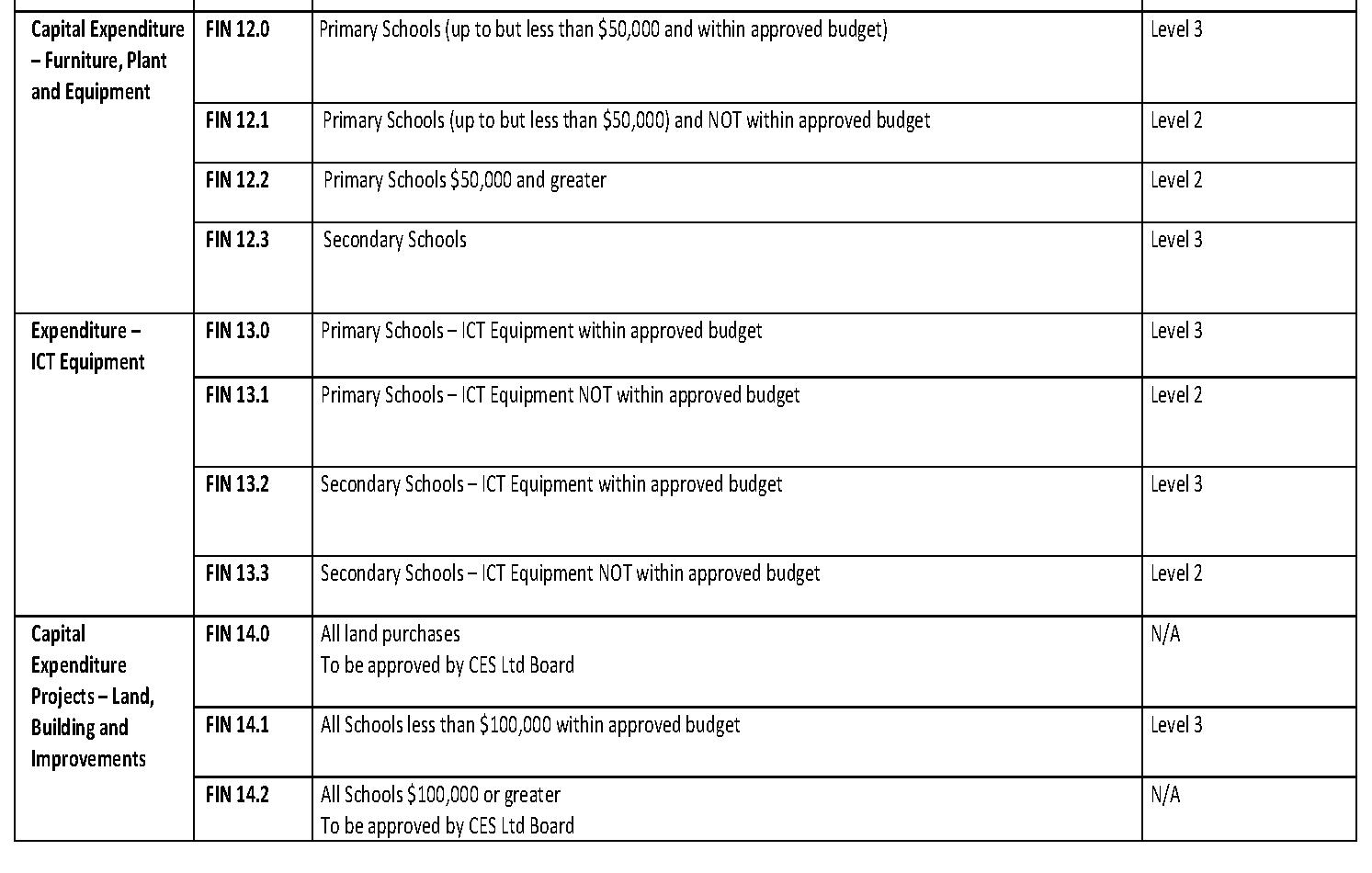
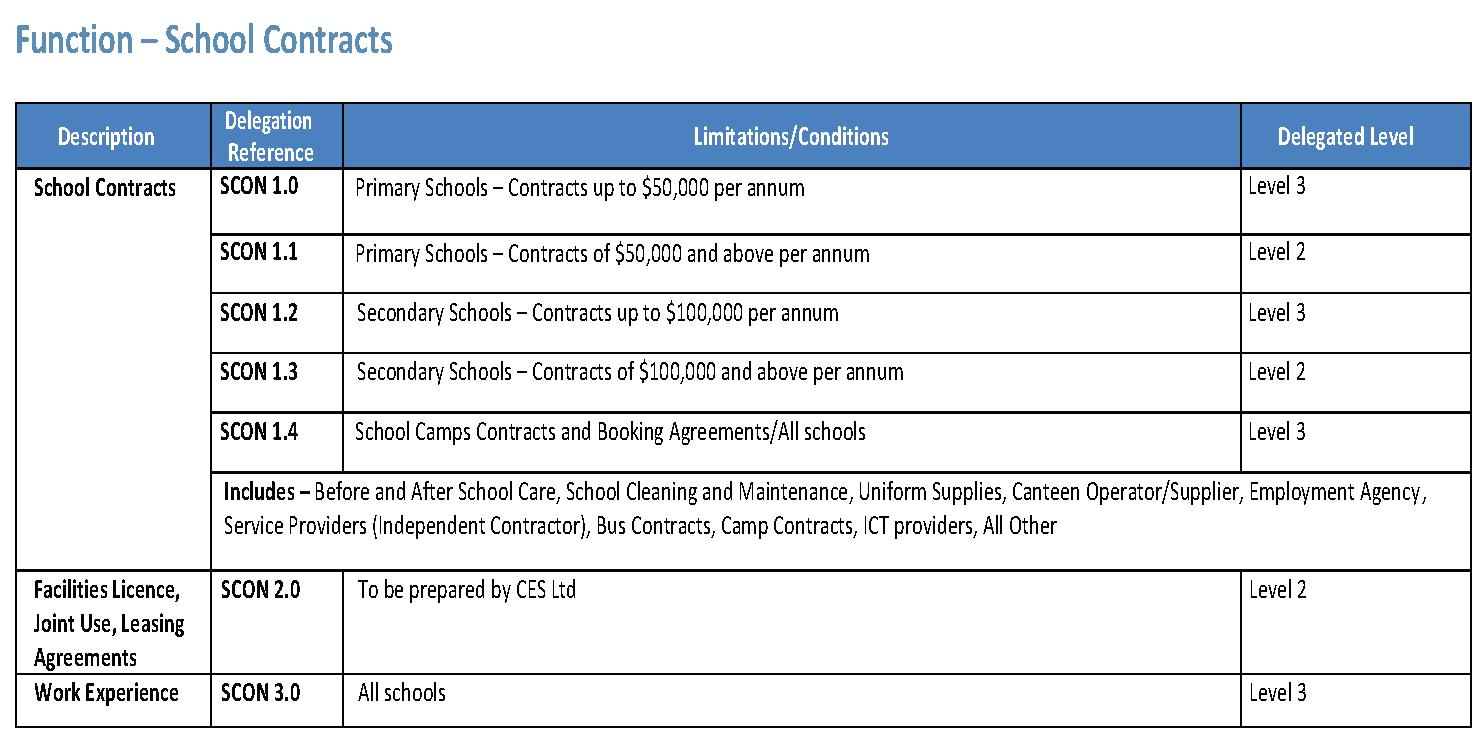
The current practices involving the schools and offices using 3 different accounting systems and autonomy over supplier selection, has caused a high risk issue with data integrity and insight reporting. Due to inconsistent data across various accounting systems, the consolidation of the information is difficult to gain category analysis of the Supply Chain. In 2023 CES Ltd Procurement Team has commenced tendering strategy plan to mitigate risk in the high-risk area of Cleaning Contractors, as well as Chemical and Consumable suppliers with the aim to provide schools and offices with a Preferred List of Providers that have been vetted to Modern Slavery Risk and inducted with Modern Slavery Training.
The Procurement Team is continuing to work with Schools and Offices internally to promote and educate staff on the Procurement & Contracts goal and values. These tools are to support our social value decision making processes in alignment with the CES Ltd Strategic Plan and Catholic Social Teachings and are designed to encourage a balanced, conscious, “moral decision” based on value alignment, that supports our strategic plan objections for “Responsible Stewardship Communities”. Pope Francis’s message is to make a choice for respecting the rights and dignities of every human being by mitigating modern slavery risk in our supply chain and is the strategic goal for Procurement at CES Ltd.

“Every person ought to have the awareness that purchasing is always a moral - and not simply an economic - act”
Pope Francis (2014)
The strategic goal is supported by a series of values to guide decision making processes for CES Ltd schools and offices.

Responsibility – In our mission as a Catholic faith community, we are committed to seeking ethical, sustainable, and socially responsible procurement as we strive to make a positive impact on the global climate and environment, support First Nations communities and abolish Modern Slavery throughout our supply chain.
Integrity - CES Ltd and Service Providers will observe the highest standards of ethics and integrity in undertaking procurement activities. All purchasing activities will comply with relevant legislation, regulations and CES Ltd policies. Service Providers will be treated fairly, respectfully and free from bias.

Clarity – We will drive transparency and accountability to support open, success-driven and respectful partnerships with our Service Providers. We strive for success with our partnerships because when our Service Providers succeed, CES Ltd and our school communities will thrive!
Community – CES Ltd greatly values our local communities and is committed to supporting and fostering prosperity with local businesses across the Sandhurst region. CES Ltd adopts Social Procurement practices to actively promote accessibility and inclusion across our Supply Chain seeking to create a positive influence and opportunities within local communities to support growth for First Nations communities, inclusion of all genders and sexualities and opportunities for Victorians with disabilities.
Balance - CES Ltd determines “the Best Value” for goods and services to balance cost, service, quality, reliability, innovation, ethics, sustainability and value alignment.
CES Ltd faces various operational risks that can have a significant impact on the organisation’s reputation and operations. One of the most critical operational risks is modern slavery, which is a grave violation of human rights that affects millions of people globally. CES Ltd has continued its partnership with the Australian Catholic Anti-Slavery Network (ACAN), allowing CES Ltd to establish a robust relationship that will continue to assist us to identify and assess risks within the organisation, reducing the chance of modern slavery practices within our supply chains.
The modern slavery operational risks outline three key areas that CES Ltd and SCECE&C Ltd need to consider to identify and address modern slavery risks within the organisation. These areas include supplier engagement, supply chain mapping, and due diligence.
Service Provider and Supplier engagement is a crucial component of modern slavery risk management within CES Ltd. Service Providers and Suppliers can pose a significant risk if they engage in unethical practices such as forced labour or human trafficking or unknowingly procure goods from high-risk international regions.
By engaging with Service Providers and Suppliers and ensuring that they adhere to ethical standards, CES Ltd can reduce the exposure to modern slavery risks. CES Ltd will also continue to encourage and support our schools with their Supply Chain in taking steps to mitigate modern slavery risks within their own supply chains.


Supply chain Category Mapping is another critical aspect of modern slavery risk management that CES Ltd will continue to explore. The aim is to have a comprehensive understanding of our supply chains and identify any areas where modern slavery risks may exist. This includes identifying countries or industries that are at high risk for modern slavery and understanding the risks associated with specific products or services. Working towards categorising and mapping supply chains will enable CES Ltd Procurement & Contracts team to develop effective strategies to mitigate modern slavery risks and ensure that our organisation is not contributing to this issue.
Due diligence is the final area that CES Ltd will continue to focus on educating and supporting our staff, schools and SCECE&C Ltd centres to manage the operational risks associated with modern slavery. This includes reviewing Service Provider, Contractor and Goods & Services contracts and high expenditure goods and materials purchases, as the organisation become more resourced and mature in this area, assessing their labour practices, and monitoring their compliance with ethical standards.
With the support of the CES Ltd Board and the Child Safety, Audit and Risk Committee, CES Ltd has a Risk Management Framework that defines our risk operating model, appetite, responsibilities, and methodology. This Framework supports the approach to managing modern slavery risks through
good governance and accountability following the ISO 3100:2018 Risk Management – Guidelines. Our Risk Management Framework and accompanying policies are crucial in effectively managing operational risks, including those associated with modern slavery. These documents provide a structured approach to identifying, assessing, and mitigating risks, and ensuring that we continue to operate in a responsible and sustainable manner.
CES Ltd recognise that the COVID-19 pandemic has had significant impacts on global supply chains, which may increase the risk of modern slavery in certain industries or regions. As part of the commitment to responsible business practices and ethical standards, CES Ltd aims to take proactive steps to educate our schools and to assess any new or heightened risks of modern slavery resulting from the pandemic. By monitoring our supply chain more closely for any signs of modern slavery, the aim is to have increased oversight of our supply chain partners to ensure compliance with our ethical standards.
CES Ltd remains committed to operating responsibly and sustainably, and will continue to take appropriate measures to manage any modern slavery risks resulting from the COVID-19 pandemic.
CES Ltd take the responsibility towards our staff, students and community very seriously. CES Ltd are committed to providing a safe and inclusive work environment where all employees and workers are treated fairly and with respect. CES Ltd believe that treating our staff well is not only the right thing to do, but it also makes good business sense, as it helps us attract and retain top talent and maintain our reputation as a responsible and ethical organisation. To mitigate the risk of modern slavery within our operations, CES Ltd have implemented several measures. These include:
• Robust recruitment practices: CES Ltd have established clear policies and procedures for recruitment and selection, including background checks and references, to ensure that all employees and workers are recruited in a fair and transparent manner.

• Training and awareness: CES Ltd are introducing training and awareness programs for our employees and workers to help them recognise and report any signs of modern slavery or other unethical practices.
• Ethical standards and code of conduct: CES Ltd have established clear ethical standards and a code of conduct that all employees and workers are required to follow. This includes a commitment to respect human rights and to report any suspected cases of modern slavery or other unethical practices.
• Feedback mechanisms: CES Ltd are working towards establishing clear feedback mechanisms that employees and workers can use to raise concerns or complaints about any issues they may face at work.
In addition to these measures, the organisation is working towards having the appropriate resources to regularly review and monitor our operations to identify and address any potential risks of modern slavery. Our aim is to work closely with our suppliers and partners to ensure that they are adhering to ethical standards and that they are taking appropriate measures to manage any modern slavery risks within their own operations.
CES Ltd, believe that our people are our greatest asset, and are committed to treating them with the respect and dignity they deserve. By taking proactive steps to mitigate the risk of modern slavery within our operations, CES Ltd are not only fulfilling our responsibilities as a responsible organisation, but are also contributing to a fairer and more just society.
Through the ACAN Program, CES Ltd and SCECE&C Ltd continue to focus activities with suppliers of labour and the operational risk associated with the following labour supply chains:
The cleaning and security sectors typically employ temporary migrant workers engaged via subcontracting arrangements with a high rate of noncompliance with workplace rights and entitlements. Equipment and consumables used in these sectors are largely manufactured overseas, predominantly in high risk countries such as China and Vietnam.


The labour force used in facilities management generally consists of temporary migrant workers Often contracted through labour hire companies.
Labour Hire
Labour hire services pose a high risk for worker exploitation and modern slavery for several reasons, including:
• focus on low-skilled, low-paid, seasonal, temporary labour
• recruitment of potentially vulnerable people such as new migrants, temporary work visa holders, international students and undocumented workers
• deceptive and opaque practices trapping workers into exploitative situations
• demanding excessive fees for visas, travel and other work arrangements, leading to debt bondage
• coercive control, threats, withholding workers’ identity documents to limit their freedom ofmovement and social isolation from community. Waste management services
The waste industry (including recycling) is a dangerous sector for workers with significant WHS risk such as exposure to toxic materials and pathogens, use of heavy machinery and dirty work environment. Modern slavery risks are similar to those faced by cleaners. Sub-contracting to small waste management companies is common across the sector as is the use of labour hire. Migrants and low-skilled workers are used in waste collection, handling and material recovery facilities.
Last year, CES Ltd conducted a gap analysis to identify areas where CES Ltd could improve practices and procedures to prevent and mitigate the risk of modern slavery. However, this year’s gap analysis showed that CES Ltd has not progressed in some areas. This was due to a number of factors, including changes in our governance and management structures.
One of the major changes was the appointment of a Chief Executive of Strategy, Risk and Governance, who brought a new perspective and approach to managing risk and compliance. This change led to a restructuring of our governance and management areas, which impacted how CES Ltd approached our modern slavery practices and procedures.
Additionally, CES Ltd appointed a Compliance and Risk Advisor who provided further expertise and support in identifying and mitigating risks, including modern slavery. While these changes were positive for the organisation, they also resulted in a temporary disruption to our systems and processes. Another change was the relocation of modern slavery responsibilities from the People and Culture and Operations team to the Strategy, Risk and Governance (Compliance and Risk) and the Operations (Procurement) team. This change required a significant effort to transfer knowledge and ensure that the new team had a full understanding of modern slavery risks and the steps required to mitigate them.

While these changes were necessary for the long-term success of the organisation, they impacted our ability to address modern slavery risks in the short term. However, CES Ltd are committed to addressing any gaps identified and implementing new practices and procedures to prevent and mitigate modern slavery risks.
Moving forward, CES Ltd will continue to work closely with the new governance and management teams to ensure that modern slavery remains a priority and is addressed effectively. CES Ltd will also continue to invest in the appropriate resources, review and update practices and procedures to ensure that they are fit for purpose and aligned with our commitment to responsible business practices.
To illustrate the differences between the gap analysis conducted last year and this year, CES Ltd has prepared a summary of the key findings and recommendations from each analysis. The summary is presented in a table format below: Category
Management Systems

Governance
Commitment
Business Systems
Action
Monitoring and Reporting
Risk Management Risk Framework
Operational Risk
Identifying External Risks
Monitoring and Reporting on Risk
(
•
• Making Progress
• Starting out
• At the starting point
(
) Improvement in Focus Area
( -
) No changes in Focus Area
) Backwards in Focus Area
Category Topic
Human Resources and Recruitment

Awareness
Policies and Systems
Training
Labour Hire / Outsourcing
Customers and Stakeholders
Customer Attitude
Information Provision
Feedback Mechanisms
Worker Voice
LEGEND
• Leading Practice
• Making Progress
• Starting out
• At the starting point
Procurement and Supply
Chain Policies and Procedures
Contract Management
Screening and Traceability
Supplier Engagement
Monitoring and Corrective Actions
( ) Improvement in Focus Area
( - ) No changes in Focus Area
( ) Backwards in Focus Area
As you can see, there are some clear differences between the key findings from the two gap analyses. What was improved, what didn’t change, and what went backwards.
CES Ltd had:
• 9 - Focus Areas of Improvement ( )
• 13 - Focus Areas of no change (-)
• 0 - Focus Areas of going backwards ( )
Management Systems Business Systems

CES Ltd subscribe to platforms such as SEDEX to identify risk, but beyond risk identification systems in place are still basic (e.g. an excel spreadsheet, a log on a share drive or the like), and there is no particular process for capturing incidents, assigning priorities or grading severity of incidents, and it does not capture progress.
Monitoring and Reporting
Risk Management Operational Risk
The governance framework guides appropriate actions, but the application is still somewhat ad-hoc. Monitoring and reporting happens when there is an incident in an ad-hoc fashion.
Processes are in place to check compliance with award wages and legislative requirements. Identifying External Risks Processes exist to identify external risk of modern slavery but it is not consistently applied.
HR and Recruitment Policies and Systems
Training
Labour Hire / Outsourcing
A policy is in place, but systems are in a state of development.
The Strategy, Risk and Governance Team have initiated the development of training for staff.
A policy is in place but the process is still not fully developed. Cases are responded to as they arise.
Customers and Stakeholders
Procurement and Supply Chain
Information Provision Broader engagement with stakeholders who share common values and goals.
Monitoring and Corrective Actions
Regular review of supplier documentation, and based on risk profile, some audits of selected suppliers are carried out. Regular monitoring is an area for improvement.
These results are based on the answers that were provided, i.e. it is a subjective self-assessment.
Based on these findings, a set of recommendations have been developed to address the gaps and ensure that our modern slavery practices and procedures are effective and robust. These recommendations include:
• Improving the communication of the modern slavery policy to all employees, to ensure that they are aware of their responsibilities and the steps required to prevent and mitigate modern slavery risks.
• Ensuring that due diligence processes are developed and consistently applied across all suppliers, to identify and manage any modern slavery risks within our supply chains.
• Implementing, reviewing and updating our training and awareness programs to ensure that they are effectively reaching all CES Ltd employees, and addressing any identified gaps in coverage.

• Identifying the gaps within teams and expanding those areas with the appropriate resources.
By implementing these recommendations, CES Ltd believes that it can effectively address the gaps identified in our gap analysis and further strengthen our modern slavery practices and procedures. CES Ltd is committed to regularly reviewing and updating these practices to ensure that they are continually improving and maintaining our commitment to responsible business practices.
CES Ltd finance systems are currently decentralised, with 3 finance accounting systems (ICON, SAAS and Synergetic) being used across the organisation and being utilised as a finance function, as opposed to a complete Supply Chain Purchase to Pay (P2P) management system. The decentralisation of data and inconsistent data entry across these platforms requires future resource investment to manage supply chain risk and improve analysis and reporting in the future.
As such the volume of goods and service providers, and the risk analysis is a high-level view based on data obtained from ICON as a single source. It should be noted that current accounting systems utilised across CES Ltd do not capture information regarding Provider Categories, Contractor or visualise Staff reimbursements without a full financial audit conducted onsite to review hard copies of invoices.



Using the data available from ICON capturing invoice history from 42 schools valuing $55m AUD to capture the top 50 suppliers of this data pool by spend as well as suppliers of key high-risk goods and services.
The highest risks areas identified for Educational institutions are:
HIGH RISK
CES Ltd SUPPLY CHAIN RISK TO MODERN SLAVERY
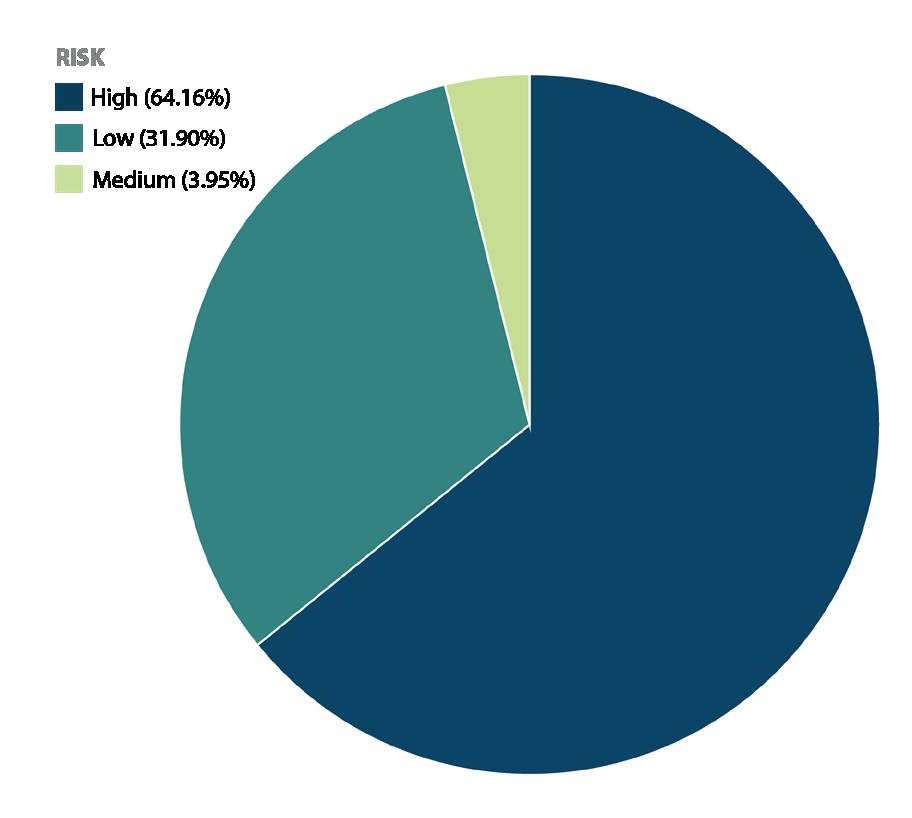
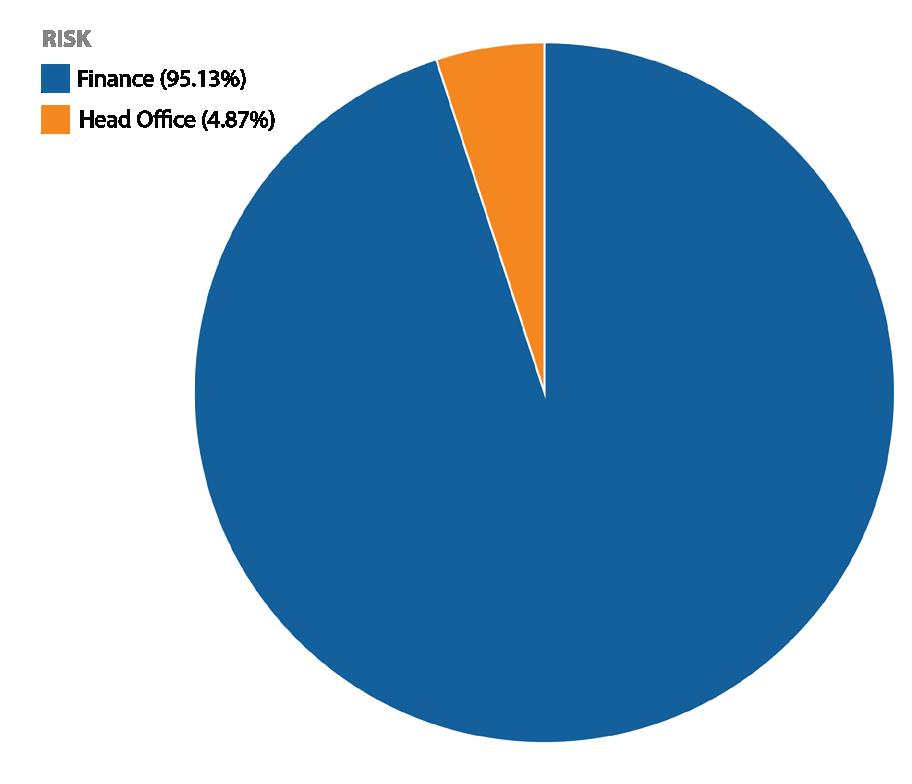
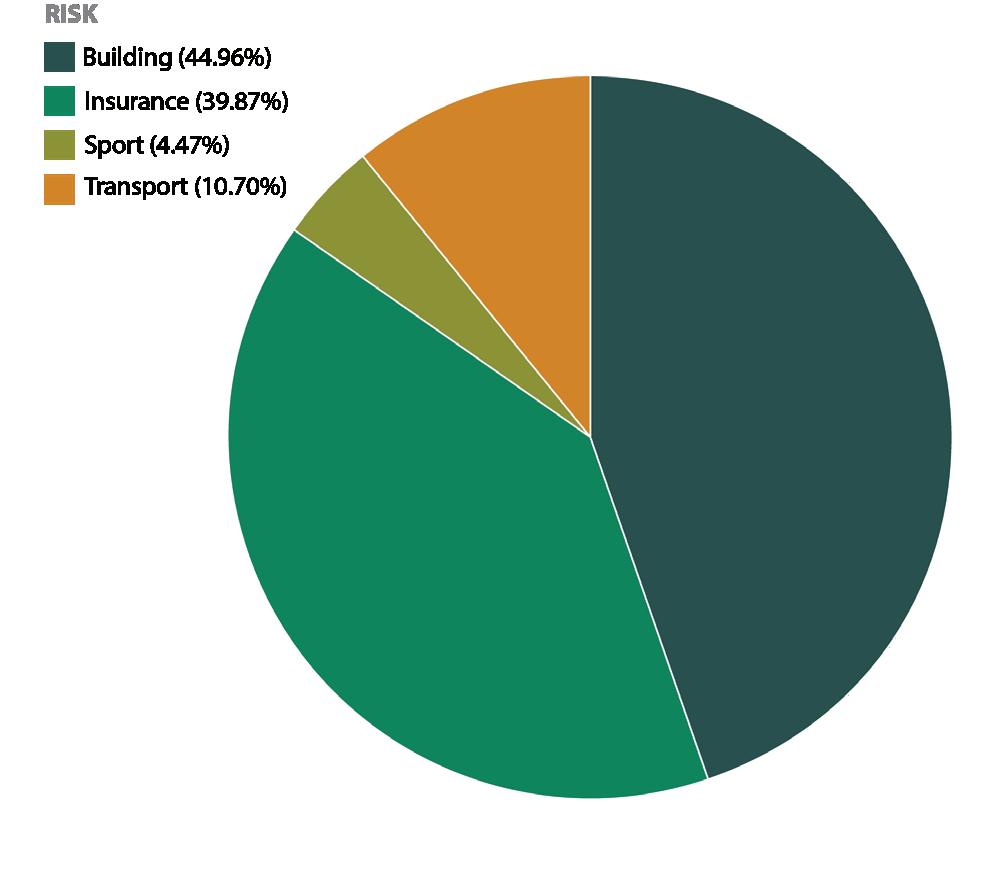

LOW RISK
MEDIUM RISK
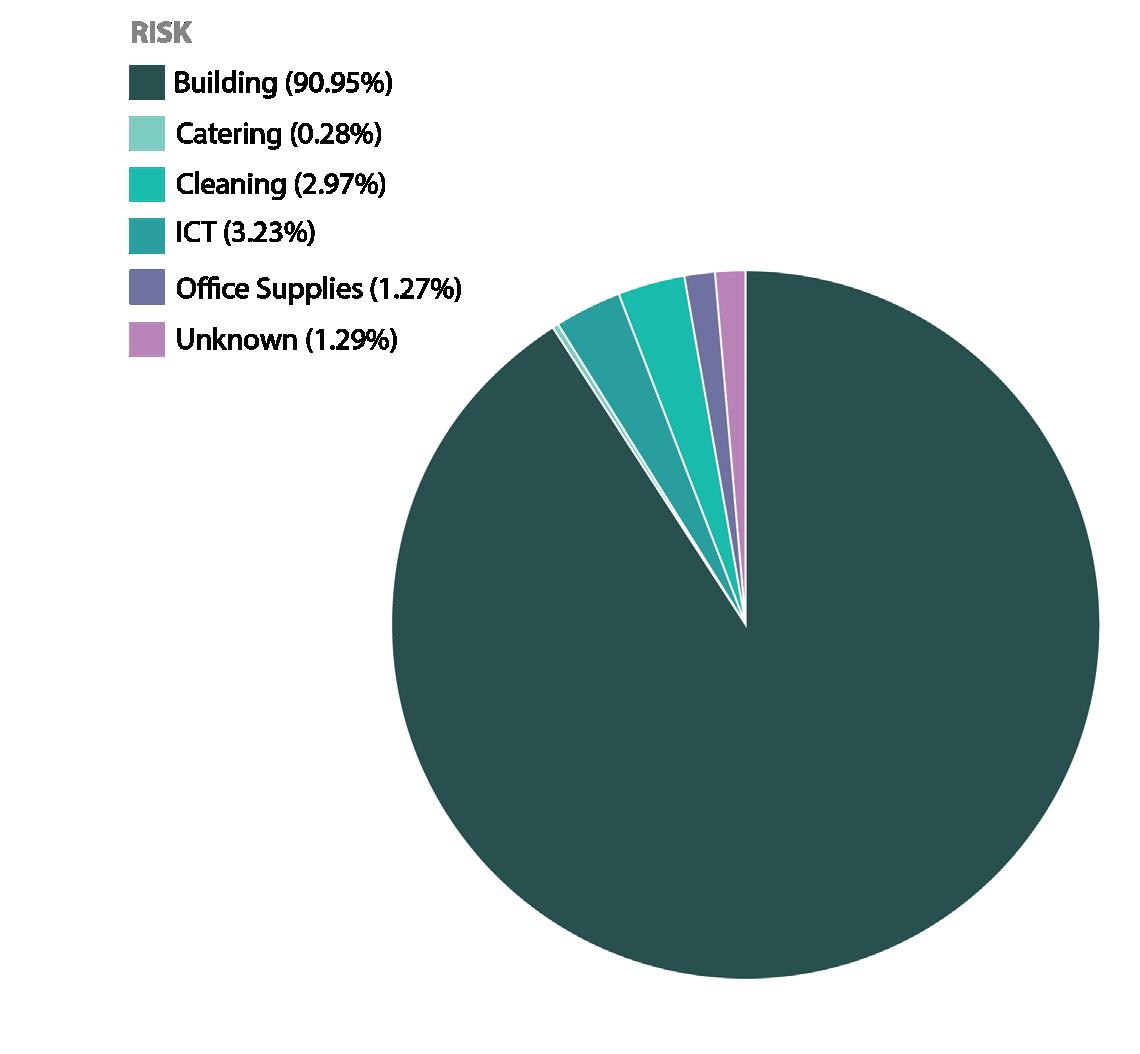
When procuring goods and services the table below identifies 4 key risk factors which can indicate an increase of modern slavery in supply chains:
Industry Sector CES Ltd and SCECE&C Ltd procures construction and facilities maintenance services, which are known to be high risk for both domestic instances of modern slavery and for the manufacturing of products used in the course of those operations.
Commodity or Product Specific products and commodities are deemed high risk by the US Department of Labor’s 2018 List of Goods Produced by Child and Forced Labor, the Global Slavery Index (GSI) and other international guidance materials.
Forced labour in the production of building and construction materials
Geographic Location The risk based on geographic location is based on the estimated prevalence of modern slavery and the government responses as outlined in the 2018 GSI. CES Ltd and SCECEC&C Ltd predominantly engages Australian suppliers, it is recognised that goods and associated services may come from countries other than those of suppliers’ headquarters.
Workforce Profile
In undertaking the supplier analysis, CES Ltd considered the type of labour involved in the production of our goods and services, particularly where low skilled, vulnerable or migrant labour is used, or where the work is deemed as ‘3D’ work (dirty, dull or dangerous).
CES Ltd and SCECEC&C Ltd recognises, for example, that electronic equipment contains metals and minerals that may be sourced from regions known to be at high risk of modern slavery practices.
For example, that electronic goods from Malaysia would be considered to be at high risk of modern slavery.
Cleaning services, may use vulnerable or migrant labour which the work is deemed as ‘3D’ work (dirty, dull, or dangerous).
Exploitation of such employment conditions, below award wages or docking of wages.
CES Ltd has identified the following risk factors and will implement a process to engage with high spend suppliers and invite them to join Sedex and Vendor Panel. In doing so, Service Providers, Contractors and Suppliers will be able to complete a comprehensive self-assessment questionnaire (SAQ). SCS will have access to results of the SAQ and any corresponding red flags factors that may contribute to modern slavery practices. Currently CES Ltd has a decentralised data system and collation of this data is under development. Clear understanding of risks in our operations will be developed further throughout 2022 and onwards.
There is further risk associated with the uncontrolled expenditure in Staff Reimbursements. While there is an approval process in place for these expenses, there is no overall visibility for these costs and is considered a High Risk procurement activity. Review of this process may be required in future by CES Ltd.

CES Ltd has completed a number of actions to address modern slavery and risks it imposes. The following actions have taken place in 2022 or continued from 2021:
• Strategy, Risk and Governance Team was established as part of the organisational restructure in 2022
• Continued partnership with the Australian Anti-Slavery Catholic Network (ACAN)
• The continued appointment of two Modern Slavery Liaison Officers (MSLO), from the Strategy Risk & Governance and Procurement & Contracts departments who lead the operational activities to identify and mitigate modern slavery risks within the organisation. The MSLOs works closely with the Executive Leadership team to collaboratively work together for the organisation approach to modern slavery. The MSLOs participate in the ACAN monthly webinars and engage with ACAN expertise on a needs basis to assist in actions to address risk of modern slavery and keep informed of new initiatives and the risk management program activities.
• CES Ltd Modern Slavery Policy - CES Ltd implanted a Modern Slavery Policy in 2021. This Policy provides a robust framework to ensure compliance with the reporting requirements of the Act, whilst also providing guidance for staff not to knowingly use or contribute to modern slavery practices.
• The development of contractual clauses for standard contracts. CES Ltd will access ACAN guidance for comprehensive clauses for high-risk contracts.
• Completed a Modern Slavery risk assessment Operations and Supply Chain.
• Completed Modern Slavery awareness training through ACAN - The two MSLO have completed modern slavery training-learning modules and are developing a training session for all of the organisation. E-learning modules cover;
» ACAN- Modern Slavery 101
» ACAN- Business Relevance
» ACAN- Implementing a Modern Slavery Risk Management Program
• Recognizing the Feast Day of St Bakhita on the 8th February concerning the plight of the victims of modern slavery.
• CES Ltd Social Justice Reference Group initiatives / website

• Attendance of a supplier engagement workshop organised by ACAN. The purpose of the workshop was to train participants on how to run supplier workshops for high-risk expenditure categories
• Completion of the 2021 BtG analysis, identifying areas in which progress has been made as well as areas requiring further attention in 2022 and beyond. These will be addressed in accordance with the Action Plans for 2021, 2022 and later years.
• Commenced supplier engagement –
» CES Ltd commenced its supplier engagement strategy by introducing modern slavery clauses in the terms of Service Agreements and in 2022 tendering RFP templates have been updated for offices and schools to include upfront information regarding Modern Slavery risk disclosure and information upon the request of CES Ltd.
» In 2021 ACAN joined Sedex, one of the world’s leading ethical trade membership organisations, working with businesses to improve working conditions in global supply chains. Via this connection, CES Ltd Procurement now has access to an online platform, tools and services to help schools operate responsibly and sustainably, protect workers and source ethically.
» In 2021 the Guiding Principles of Procurement was developed with the aim to establish CES Ltd’s values and commitment to responsible procurement. In 2022 this was refined to the Procurement Goal & Values as an educational philosophy to move Schools and Business units away from viewing Procurement activities as a transaction, and instead, a conscious moral decision

» In 2022 a Working Party with members including, Procurement and Contracts, Risk and Governance, People and Culture and the Capital Planning team was established to review Contractor management, develop a School and Office awareness plan and a Supplier Code of Conduct. Updated Supplier Induction Procedures will be developed and distributed in 2023 and 2024, with the current practice for Service Providers to adhere to CES Ltd policies and codes. The Procurement Team is working on a tailored document specifically for Service Providers.
» In 2021 ACAN joined the Cleaning Accountability Framework. CAF is a multi-stakeholder organisation that exists to end exploitation in property services and improve labour standards through education and advocacy. CAF stakeholders work together in a spirit of cooperation to drive responsible standards for the procurement, management and delivery of cleaning services. This occurs through CAF Certification, a worker-centric due diligence mechanism that assesses, addresses and mitigates the risk of labour exploitation by engaging workers and other supply chain stakeholders. In 2022-23 CES Ltd will have access to these resources in order to develop a review of Cleaning providers
CES Ltd is committed to following the 5 Step action plan as provided by ACAN to guide and support our processes and objectives to reduce the risk of modern slavery in our operations.
Progress has been made in this reporting period from the Road Map, and some actions have been achieved, but there are still areas of improvement and opportunities to build and educate all our staff and stakeholders.
Areas in bold text, indicate action has been taken or under development.
Engage top management and set direction
Adopt the Modern Slavery Policy
Establish a Modern Slavery Action Working Party
Define roles and responsibilities
Understand what you are doing well and where your gaps are to manage modern slavery risks
Prepare and implement a modern slavery action plan or strategy to address your gaps
Monitor progress and ensure continual improvement
Prioritise suppliers based on potential risk and spend
Seek responses from suppliers on their modern slavery actions in EOI or tender processes
Clearly outline expectations to suppliers
Engage and train management, employees and contractors

Engage and educate highest priority suppliers
Establish remedy pathway to respond when slavery practices identified in operations or supply chain
Prepare draft Modern Slavery Statement and submit to leadership for signature
Collaborate with ACAN participants to develop Modern Slavery Compendium and upload to Commonwealth Modern Slavery Statement Register
Publish Modern Slavery Statement on entity website

CES Ltd is committed to ensuring it provides appropriate and timely remedy to people impacted by modern slavery in accordance with the Commonwealth Modern Slavery Act 2018 – Guidance for Reporting Entities and relevant Australian laws.
Due to the complexity of remediation, the need for specialist resources and to ensure the most comprehensive and rights-compatible outcomes for people impacted by modern slavery, CES Ltd is utilising the Domus 8.7 program from ACAN - an independent program to provide remedy to people impacted by modern slavery.
CES Ltd has not had the opportunity to review the remediation program, but will enhance future directions through further policy development, detailed response procedures and engagement with Domus 8.7 and other civil society stakeholders. By partnering with ACAN, Domus 8.7, CES Ltd can help people impacted by modern slavery achieve meaningful outcomes that can be reported on and continuously improve risk management and our response.
Where CES Ltd is directly linked to modern slavery by a business relationship, CES Ltd is committed to working with the entity to ensure remediation and mitigation of its recurrence. Remediation obligations and expectations are included in contracts with high-risk suppliers who must notify and consult with CES Ltd to ensure victim centred remediation processes are implemented to the satisfaction of CES Ltd. When suspicions of modern slavery practises come to our attention through whistle-blower or other channels, staff will contact the Modern Slavery Liaison Officers (MSLO) in the first instance. Then the MSLO will contact the relevant law enforcement agencies and/or Domus 8.7 for an assessment, investigation, action planning and implementation of a remediation process. A documented remedy pathway is an important requirement of the Modern Slavery Act.
Through the ACAN Program, CES Ltd agencies have access to the expertise and independent advice available through Domus 8.7. CES Ltd agencies or parishes can make referrals of people impacted by modern slavery to obtain support, advice and guidance on how to respond to concerns.
The right to remedy is a basic principle in international human rights law. The provision of remedy involves a business implementing actions and processes to investigate and redress negative impacts on people involved in business operations and supply chains, and ensure future incidents are prevented.
Domus 8.7 principles:
• Independent advice and support
• Ensuring people impacted are safe and protected
• Any work undertaken is with the full knowledge and consent of people impacted
• Human rights based approach
Domus 8.7 overview:
• A vital service and key element of the ACAN Program


• Addresses a key mandatory reporting requirement of the MSA
CES Ltd Board and Child Safe, Audit and Risk Committee will oversee the ongoing development of the planning and program to manage risks within our organisation of modern slavery. The ACAN Action Plan and Road Map provides a great base to build on our planning and our commitment from all staff and stakeholders. The “Bridge the Gap” analysis was completed and the assessment has provided clear actions and key components that require development. Our target for 2022, is to make improvements over the majority of the indicators provided from the ‘Bridge the Gap’ assessment tool.
This statement is provided as a single reporting entity, pursuant to section 13 of the Modern Slavery Act 2018 (Cth) and incorporates the activities and operations of the 52 Sandhurst diocesan schools and also includes subsidiary entity SCECE&C Ltd’s two early learning centres.
For the preparation of this statement the CES Ltd Compliance and Risk Advisor and Procurement and Contracts Advisor consulted with different functional departments across CES Ltd and SECEC&C Ltd such as Operations (Finance and Procurement teams), Strategy, Risk and Governance Team, People and Culture Team, and Communication Managers, as well as ACAN and other participating members of the ACAN network.
This consultation with ACAN and other departments has informed the approach to ensure it is appropriate and effectively tailored to reflect our organisational context and will be an ongoing consultation process for future initiatives, activities and statements.


Next Steps for 2023
Strategic Procurement Action and Risk Mitigation Plan:
• ICON is undergoing a significant upgrade in 2024 to be managed by CECV. It is highly recommended that as part of this upgrade and project that a review of financial data quality, system functionality and end user training in the ICON system is to be undertaken by CES Ltd and CECV to be able to provide a future solution for accurate data and reporting capability for the Supply Chain across CES Ltd as part of this project. This is will enable accurate identifying supply chain risk and establishment of a monitoring strategy and better reporting functionality
• Supplier Engagement Strategy to raise awareness of Modern Slavery Risk through Procurement Tendering Practices
• Develop and implement specific Service Provider Code of Conduct and update to Supplier Induction procedures as part of ongoing review into Contractor Management processes.
• Refinement of Modern Slavery and Whistleblower policies to strengthen notification procedures governed by these policies
Staff Education
CES Ltd, is committed to addressing modern slavery risks within our operations and supply chains and understands the importance of providing adequate training to our staff and those of SCECE&C Ltd to effectively identify and address these risks, as required by the Modern Slavery Act.
The aim for 2023 will be to pilot a new training program through the Anti-Slavery Community Action Network (ACAN), which will target all head office staff, Principals, Key Leaders, and Business Managers within our schools. This training program covers the identification of modern slavery risks, reporting mechanisms for suspected cases of modern slavery, and steps to take to mitigate modern slavery risks. The training is tailored to the specific roles and responsibilities of these staff members to ensure they have the necessary knowledge to carry out their duties effectively.
In addition, the training program includes information on our policies and procedures for addressing modern slavery risks, including measures to assess and address risks within the supply chain. CES Ltd understand the importance of supplier due diligence and have implemented effective supplier assessment procedures to ensure compliance with the Modern Slavery Act.
This training program will be an important step towards eradicating modern slavery from our operations and supply chains. CES Ltd are committed to continuing to work with ACAN to develop and improve our training programs, and to ensure that all relevant staff members are equipped with the necessary knowledge and skills to identify and address modern slavery risks.
Overall, CES Ltd are committed to promoting ethical practices throughout our operations and supply chains, and believe that this pilot training program is a positive step towards achieving this goal.
A Modern Slavery Action Working Party to be redefined in 2023 to reflect the new Organisational Structure and will meet once a term to monitor the progress of the Modern Slavery Action Plan.
The Working Group will inform and report to CES Ltd’s Executive Leadership Team, Child Safety and Audit Risk Committee and Board on all issues related to modern slavery and CES Ltd’s role in managing and mitigating modern slavery risks.
The objectives of the Modern Slavery Action Working Group are to:
• Provide input and recommendations for continuous improvement for CES Ltd on risks and issues related to modern slavery;
• Actively support the development and implementation of CES Ltd’s Modern Slavery Action Plan;
• Assist CES Ltd to determine priority actions to be undertaken and to establish annual goals and targets;

• Monitor and review actions taken to assess and address modern slavery risks and evaluate their effectiveness; and
• Ensure CES Ltd meets the requirements of the Modern Slavery Act 2018 (Cth).
The action working party is comprised of representatives from all across the entity in order to provide maximum input and recommendations for continuous improvement for CES Ltd on risks and issues related to modern slavery.
Prior to the incorporation of CES Ltd, The Social Justice Reference Group (SJRG) has existed in the organisation for many years and has evolved over time. The SJRG is mandated to ensure our schools respond to the mission of Jesus encapsulated by John 10:10 by ensuring regular social justice activities are conducted at diocesan and local levels. These activities are clearly grounded in a well-developed understanding of the principles of Catholic Social Teaching, particularly showing respect and compassion for the dignity of all humankind.
The purpose of the SJRG is;
1. To demonstrate that through our Catholic Identity social justice is core to Learning & Teaching, Wellbeing, Leadership and Stewardship of Resources.
2. To educate and empower all members of our Sandhurst school communities to uphold and respond to the principles of Catholic Social Teaching.
3. To provide a space for social justice initiatives to be generated and discerned for proposed common applications in schools throughout the diocese.
4. To collect and map key social justice initiatives throughout the diocese to ensure a common voice and clear message.
The SJRG believes that opportunities to experience inequity and injustice lead to awareness which has the potential to transform and lead to justice action. The SJRG has been actively involved with the school communities in awareness raising, action for solidarity, advocacy and action for change as the principles which inform and guide an interdependent approach to social justice initiatives and programs.
The SJRG includes representation across the school community
• Primary and Secondary Teachers
• CES Ltd Catholic Identity Team
• Diocesan Caritas/Justice Coordinator
• CES Ltd Indigenous Education Officer
• Secondary Students

Modern Slavery Liaison Officers participated in the following



Procurement practices has an important part to play in combating Modern Slavery. The role of procurement is to identify, assess and mitigate Modern Slavery risk in the Supply Chain and operations of organisations.
Procurement and Contracts plays a vital role in ensuring suppliers have been screened appropriately for Modern Slavery Risk during the sourcing process by;
• Identifying whether the goods and services to be procured carry significant modern slavery risks and whether these can be mitigated through the procurement process. Procurement’s role is to help identify risks and vulnerabilities within our operations and supply chains through due diligence allow proactive identification of high-risk areas.
• Considering the supplier’s proposed approach to addressing modern slavery risks when evaluating and assessing their tender submission, including their responses to the Supplier Questionnaire.
• Contract negotiations and including specific clauses in agreements that guard against modern slavery risks in contracts with supplier
• Continually work in collaboration with suppliers to incorporate measures safeguarding against potential modern slavery risks and monitor progress. Put action plans in place to mitigate the risks identified.
For further information please contact the MSLOs at mslo@ceosand.catholic.edu.au

In the fight against modern slavery, risk and compliance practices serve as indispensable tools. Through diligent risk assessments, regulatory compliance, responsible supply chain management, and the cultivation of ethical business practices, our organisation can play a crucial role in identifying and preventing Modern Slavery Risks.
By integrating risk and compliance practices we are able to demonstrate our commitment to human rights, enhance transparency, and contribute to collective efforts in combating modern slavery through:
• Regulatory Compliance: Supports our understanding and ensures that we adhere to anti-slavery laws and regulations. Compliance includes reporting obligations, transparency in supply chains, and due diligence on suppliers.
• Ethical and Responsible Business Practices: By implementing robust risk and compliance practices, we aim to demonstrate our commitment to upholding human rights, fair labour practices, and social responsibility, as mandated by the Australian Modern Slavery Act.
• Due Diligence and Monitoring: Risk and compliance practices enables CES Ltd to conduct due diligence on suppliers, and contractors.

• Organisational Culture and Awareness: Integrating risk and compliance practices into the company culture raises awareness amongst our employees and stakeholders about the risks and impact of modern slavery. This creates a vigilant environment where everyone understands their roles in identifying, preventing, and reporting potential cases of exploitation.
For further information please contact the MSLOs at mslo@ceosand.catholic.edu.au

The Catholic Church has a history of anti-slavery action from working to end Transatlantic slavery to supporting people impacted by modern slavery and by tackling its root causes.
Catholic anti-slavery initiatives focused on prevention, support and systemic drivers are delivered across the world every day by clergy, lay Catholics, parishes and large organisations such as Caritas, the International Catholic Migration Commission and the Order of Malta. ACAN participating entities are united in the belief that action against modern slavery is fundamental Catholic Social Teaching. Pope Francis has called modern slavery “a crime against humanity.” He has pledged with other global religious leaders to rid the world of this affront to human dignity and human freedom.
Catholic schools, hospitals, aged care facilities, universities, community services, investment and finance are just some of the Catholic institutions that touch the lives of millions of Australians. 1 in 5 Australian children are educated in Catholic schools (approximately 800,000) and 1 in 10 hospital patients and aged care residents receive care in Catholic facilities.
The extent of the supply chains is therefore highly significant and constitutes the major exposure to modern slavery for Catholic entities in Australia. The Australian Catholic Anti-Slavery Network (ACAN) brings together Catholic entities to leverage their collective purchasing spend, share resources and coordinate action to manage modern slavery risk across their industry sectors.
Catholic entities participating in ACAN are strongly positioned to respond effectively to the statutory requirements in the Modern Slavery Act with a comprehensive risk management program. The Modern Slavery Statements of Catholic entities will also form a compendium of Catholic principles and action for the advancement of human dignity and the common good. CES Ltd and SCEC&C Ltd are proud to be working in partnership with ACAN and network participants to deliver on the commitment to end Modern Slavery.
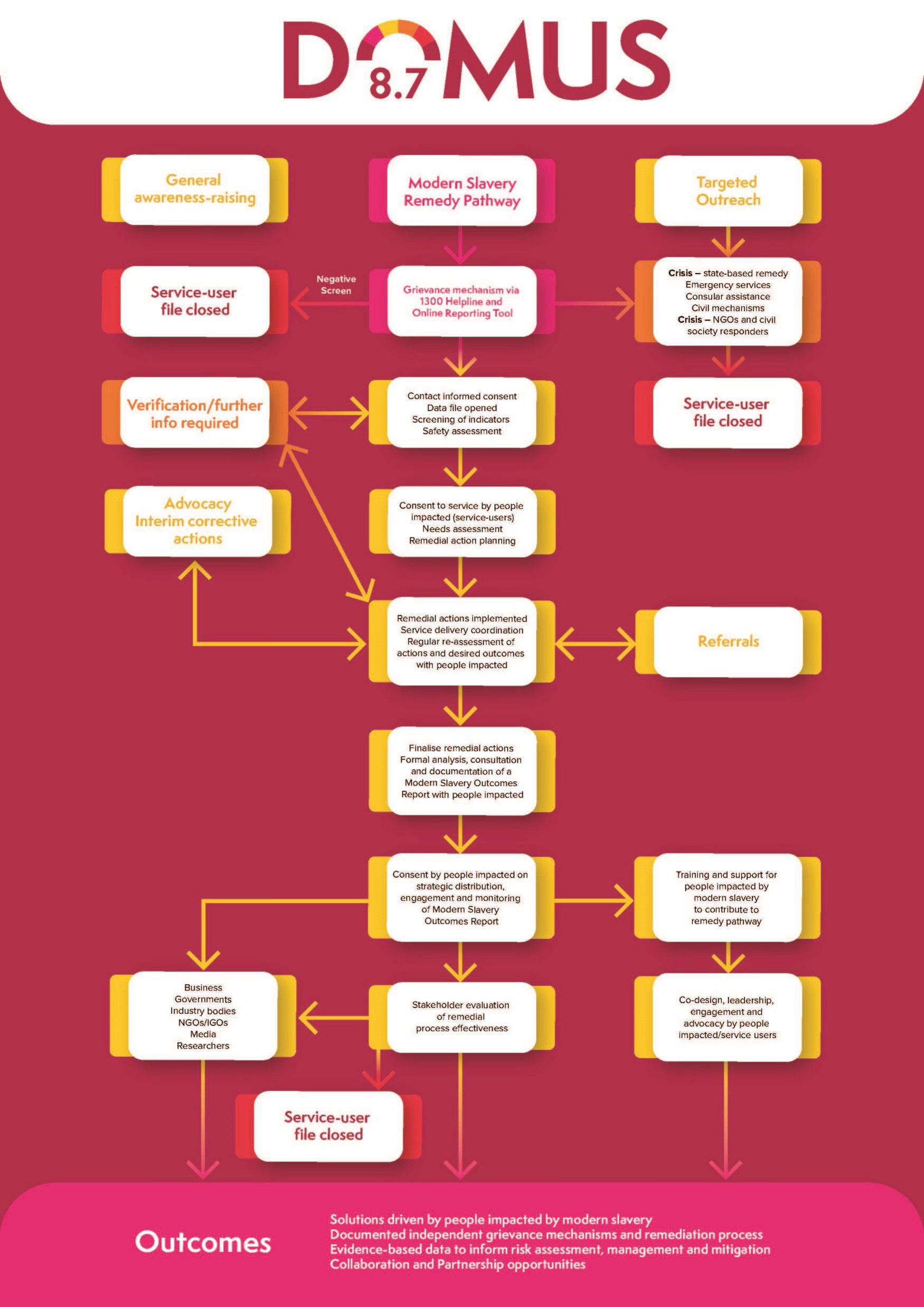

Through the ACAN Program, CES Ltd has access to the expertise and independent advice available through Domus 8.7. CES Ltd Schools, Offices & Early Learning can make referrals of people impacted by modern slavery to obtain support, advice and guidance on how to respond to concerns.



 Catholic Education Sandhurst Ltd
Catholic Education Sandhurst Ltd